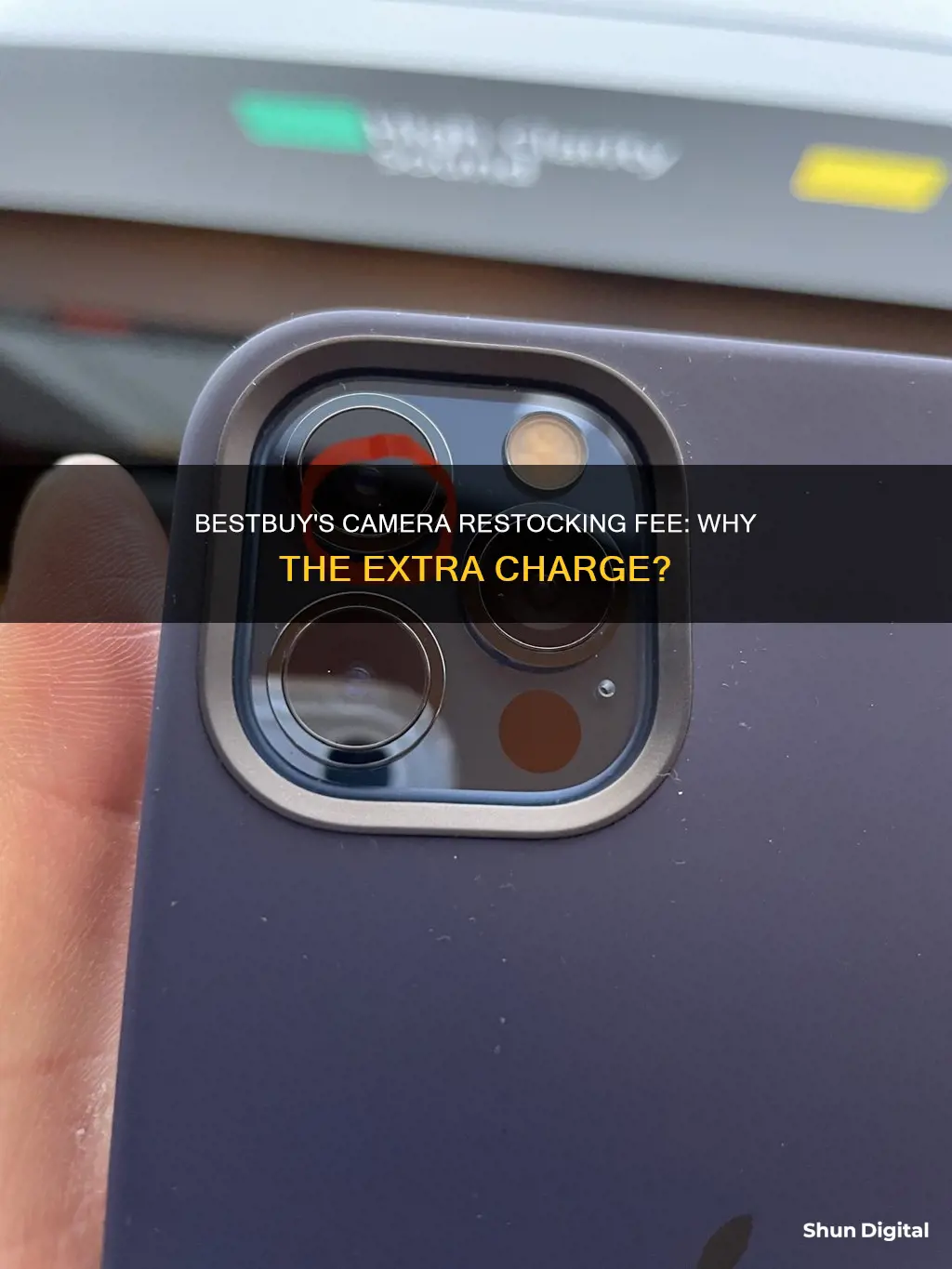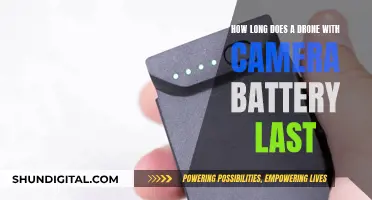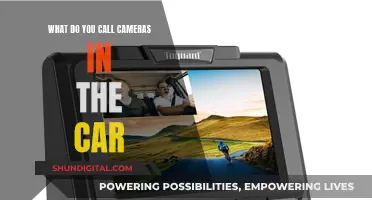
Best Buy charges a restocking fee of 15% on certain items, including drones, digital cameras, camera lenses, camcorders, projectors, and special-order products. This fee is waived if the product is returned unopened or if the purchase and return occur in states that prohibit restocking fees, such as Alabama, Colorado, Hawaii, Iowa, Mississippi, Ohio, Oklahoma, and South Carolina. The fee discourages impulse buying and renting, which wastes shipping costs and resources.
| Characteristics | Values |
|---|---|
| Items that incur a restocking fee | Drones, digital cameras, camera lenses, camcorders (including action cameras), electric bikes, electric mopeds, golf launch monitors, premium scooters, super scooters, mobility scooters, electric wheelchairs, leg and body recovery systems, projectors, projector screens, premium cold tubs, premium saunas, and special-order products |
| Restocking fee amount | 15% of the item's purchase price |
| Items that do not incur a restocking fee | Unopened items, items purchased in AL, CO, HI, IA, MS, OH, OK, SC, and where prohibited by law |
| Reason for restocking fee | To claw back lost profit on selected items as the store cannot sell the item as new and will have to sell the returned item as refurbished or used |
What You'll Learn

Best Buy charges a 15% restocking fee on cameras
Best Buy charges a 15% restocking fee on certain items, including drones, digital cameras, camera lenses, camcorders (including action cameras), electric bikes, electric mopeds, premium scooters, super scooters, mobility scooters, electric wheelchairs, leg and body recovery systems, projectors, projector screens, and special-order products. This fee is waived if the product is unopened or if the purchase occurs in Alabama, Colorado, Hawaii, Iowa, Mississippi, Ohio, Oklahoma, South Carolina, and where prohibited by law.
The restocking fee is implemented because Best Buy cannot sell the returned item as new and will have to sell it as refurbished or used. The fee is intended to recoup lost profits on these items. Additionally, the fee discourages impulse buying that wastes shipping costs and resources.
Best Buy's return policy allows for returns and exchanges within a specified time frame for most products, with some exceptions for certain items. The policy applies to new, open-box, clearance, pre-owned, and refurbished items. Returns are accepted in-store or by mail, with free shipping provided for returns by mail.
It is important to note that Best Buy may deny returns for items that are damaged, unsanitary, or missing major components. Returns lacking proof of purchase may also be denied or limited, and state sales taxes and fees may not be reimbursed.
Eufy Camera Charging: Mounting Prep or Not?
You may want to see also

This fee is waived if the product is unopened
Best Buy customers are usually charged a restocking fee of 15% on certain items, including drones, digital cameras, camera lenses, and camcorders. This fee is waived if the product is unopened, or if the purchase occurs in Alabama, Colorado, Hawaii, Iowa, Mississippi, Ohio, Oklahoma, and South Carolina, and where prohibited by law.
The restocking fee is implemented to discourage impulse buying that wastes shipping costs and resources. The fee also applies to drones, projectors, and rideables as these products must be sent back to the manufacturer to be verified for functionality.
Best Buy's return policy can be a little confusing, but it's important to note that the company typically provides a 15-day return and exchange policy for most products, though additional terms and conditions may apply. The return period begins the day the customer receives the product and applies to new, clearance, open-box, refurbished, and pre-owned products.
It's worth mentioning that Best Buy may deny returns for items that are damaged, unsanitary, or missing major components. The company also requires that products be returned in like-new condition with all accessories and original packaging.
Charging the HP R847: A Step-by-Step Guide
You may want to see also

The fee is also waived in certain US states
Best Buy's restocking fee is waived in certain US states, including Alabama, Colorado, Hawaii, Iowa, Mississippi, Ohio, Oklahoma, and South Carolina. This is because consumer protection laws in these states do not allow restocking fees.
In addition to these eight states, the restocking fee is also waived in any state where it is prohibited by law. Municipalities can also ban restocking fees, so it is worth checking city and county laws as well.
Charging Your Canon 80D: A Quick Guide
You may want to see also

The restocking fee is charged because the returned item will be sold as refurbished
Best Buy charges a restocking fee on certain items, including drones, digital cameras, camera lenses, camcorders (including action cameras), electric bikes, electric mopeds, premium scooters, super scooters, mobility scooters, electric wheelchairs, leg and body recovery systems, projectors, projector screens, and special-order products. The restocking fee for these items is 15% of the item's purchase price.
In the case of electronic items, the store must also spend time erasing personal data and restoring the device to its factory settings. This process is necessary to protect the customer's privacy and ensure that the device is in a condition that can be resold. Additionally, if any accessories are missing from the original purchase, the retailer may need to offer additional discounts on the refurbished item.
Restocking fees are typically detailed in a company's return policy, and it is important for customers to read these policies carefully before making a purchase. By understanding the return policy, customers can make more informed decisions and potentially avoid incurring restocking fees.
Charging Enel3e Camera Battery: Alternative Methods to Try
You may want to see also

The restocking fee discourages impulse buying
Best Buy charges a restocking fee for selected items that have been opened. This includes items such as drones, cameras, lenses, projectors, and special-order products. The restocking fee for these items is typically 15% of the item's purchase price. For example, if a customer purchases a $4,000 camera and decides to return it, they will be charged a restocking fee of $600. This is a significant amount of money and can act as a deterrent for customers who are considering returning an item.
The restocking fee is designed to discourage customers from treating Best Buy as a rental store. By charging a restocking fee, Best Buy can recoup some of the losses incurred when customers return items. In addition, the restocking fee discourages impulse buying by making customers think twice before making a purchase.
The restocking fee also helps to cover the cost of shipping and resources wasted when customers return items. When items are returned, they often need to be sent back to the manufacturer to be verified for functionality. This process can be costly for Best Buy, and the restocking fee helps to offset these costs.
Overall, the restocking fee is an important tool for Best Buy to manage returns and discourage impulse buying. It helps to ensure that customers are making thoughtful purchases and reduces the number of returns the store has to process. By discouraging impulse buying, Best Buy can focus on serving customers who are truly interested in their products.
Charging Your 808 Camera: How Long is Too Long?
You may want to see also
Frequently asked questions
Best Buy charges a restocking fee on cameras because the store cannot sell the item as new and will have to sell the returned item as refurbished or used. The restocking fee is charged to claw back lost profit on the selected items, and consequently, the store does not provide 100% refunds.
Best Buy charges a 15% restocking fee on the item's purchase price.
You can avoid paying a restocking fee by not opening the item. If the item is unopened, Best Buy will not charge a restocking fee.







